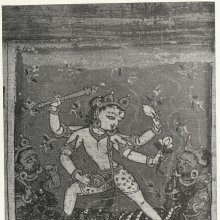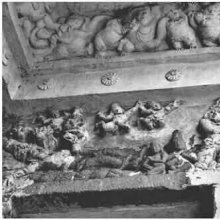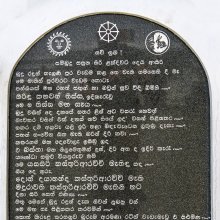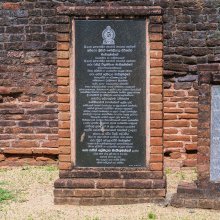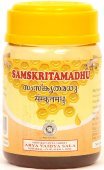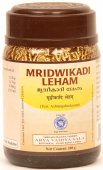Matu, Mātu, Mātu, Maṭu, Māṭu: 10 definitions
Introduction:
Matu means something in Buddhism, Pali, Hinduism, Sanskrit, Hindi, biology, Tamil. If you want to know the exact meaning, history, etymology or English translation of this term then check out the descriptions on this page. Add your comment or reference to a book if you want to contribute to this summary article.
Images (photo gallery)
In Hinduism
Vyakarana (Sanskrit grammar)
Source: Wikisource: A dictionary of Sanskrit grammarMatu (मतु).—The same as मतुप् (matup) a tad. affix showing possession; the word is frequently used in Pāṇini's rules for मतुप् (matup). cf. मतोश्च बह्वजङ्गात् । (matośca bahvajaṅgāt |) P. IV 2.72; cf. also, P.IV. 4.125, 136; V. 2.59, VI.1.215, VI.3.118,130; VIII. 2.9; for the sense of मतु (matu) see मतुप् (matup) below. The affix मतु (matu) (instead of मतुप् (matup) of Pāṇini) is found in the Atharva Prātiśakhya.

Vyakarana (व्याकरण, vyākaraṇa) refers to Sanskrit grammar and represents one of the six additional sciences (vedanga) to be studied along with the Vedas. Vyakarana concerns itself with the rules of Sanskrit grammar and linguistic analysis in order to establish the correct context of words and sentences.
In Buddhism
Tibetan Buddhism (Vajrayana or tantric Buddhism)
Source: academia.edu: The Structure and Meanings of the Heruka MaṇḍalaMātu (मातु) is the name of a Vīra (hero) who, together with the Ḍākinī named Mātunī forms one of the 36 pairs situated in the Ākāśacakra, according to the 10th century Ḍākārṇava chapter 15. Accordingly, the ākāśacakra refers to one of the three divisions of the dharma-puṭa (‘dharma layer’), situated in the Herukamaṇḍala. The 36 pairs of Ḍākinīs and Vīras [viz., Mātu] are dark blue in color; they each have one face and four arms; they hold a skull bowl, a skull staff, a small drum, and a knife.

Tibetan Buddhism includes schools such as Nyingma, Kadampa, Kagyu and Gelug. Their primary canon of literature is divided in two broad categories: The Kangyur, which consists of Buddha’s words, and the Tengyur, which includes commentaries from various sources. Esotericism and tantra techniques (vajrayāna) are collected indepently.
Biology (plants and animals)
Source: Google Books: CRC World Dictionary (Regional names)Matu in Southern Africa is the name of a plant defined with Strychnos pungens in various botanical sources. This page contains potential references in Ayurveda, modern medicine, and other folk traditions or local practices It has the synonym Strychnos occidentalis Soler. (among others).
Example references for further research on medicinal uses or toxicity (see latin names for full list):
· Notulae Systematicae. Herbier du Museum de Paris (1950)
· Die Natürlichen Pflanzenfamilien (1892)
If you are looking for specific details regarding Matu, for example extract dosage, pregnancy safety, side effects, diet and recipes, health benefits, chemical composition, have a look at these references.

This sections includes definitions from the five kingdoms of living things: Animals, Plants, Fungi, Protists and Monera. It will include both the official binomial nomenclature (scientific names usually in Latin) as well as regional spellings and variants.
Languages of India and abroad
Pali-English dictionary
Source: BuddhaSasana: Concise Pali-English Dictionarymātu : (f.) mother.
Source: Sutta: The Pali Text Society's Pali-English DictionaryMātu°, see mātā. (Page 528)

Pali is the language of the Tipiṭaka, which is the sacred canon of Theravāda Buddhism and contains much of the Buddha’s speech. Closeley related to Sanskrit, both languages are used interchangeably between religions.
Sanskrit dictionary
Source: Cologne Digital Sanskrit Dictionaries: Monier-Williams Sanskrit-English DictionaryMātu (मातु):—[from mā] m. (in music) = vāg-varṇa-samudāya, [Saṃgīta-sārasaṃgraha]
[Sanskrit to German]
Sanskrit, also spelled संस्कृतम् (saṃskṛtam), is an ancient language of India commonly seen as the grandmother of the Indo-European language family (even English!). Closely allied with Prakrit and Pali, Sanskrit is more exhaustive in both grammar and terms and has the most extensive collection of literature in the world, greatly surpassing its sister-languages Greek and Latin.
Hindi dictionary
Source: DDSA: A practical Hindi-English dictionaryMātu (मातु):—(nf) mother.
...
Kannada-English dictionary
Source: Alar: Kannada-English corpusMātu (ಮಾತು):—
1) [noun] expression or communication of thoughts and feelings by spoken words; speech.
2) [noun] that which is expressed by writing; a written statement.
3) [noun] a system of vocal sounds and combinations of spoken sounds, specific to a particular region, group of people, etc., to which meaning is attributed, used for the expression or communication of thoughts and feelings; a language.
4) [noun] 'any of four ancient sacred books (or collectively all the four books) of Hinduism, consisting of hymns, chants, sacred formulas, etc.: Veda.'5) [noun] something told; news; intelligence; word; information.
6) [noun] interchange of thoughts, information, etc., by spoken words; oral communication between persons; conversation.
7) [noun] an oral or written agreement to do or not to do something; a vow; a promise.
8) [noun] mutual pledge to marry; engagement; a betrothal.
9) [noun] accusation; condemnation; censure; blame.
10) [noun] exchange of bitter words; verbal wrangle.
11) [noun] ಮಾತಿನ ವಾಸಿ [matina vasi] mātina vāsi stubborn courage, brave perseverance one has in keeping his or her promise; ಮಾತನ್ನು ಎತ್ತು [matannu ettu] mātannu ettu to initiate talking on a topic, subject; ಮಾತಿಗೆ ತಪ್ಪು [matige tappu] mātige tappu to fail to keep one’s promise; ಮಾತು ಆಡಿದರೆ ಹೋಯಿತು, ಮುತ್ತು ಒಡೆದರೆ ಹೋಯಿತು [matu adidare hoyitu, muttu odedare hoyitu] mātuāḍidare hōyitu, muttu oḍedare hōyitu (prov.) a word spoken is an arrow let fly, which cannot be taken back (hence one has to think before speaking); ಮಾತನ್ನು ತೂಗಿ ನೋಡು [matannu tugi nodu] mātannu tūgi nōḍu to consider and ponder in the mind carefully before talking; ಮಾತು ಬಲ್ಲವನಿಗೆ ಜಗಳವಿಲ್ಲ, ಊಟ ಬಲ್ಲವನಿಗೆ ರೋಗವಿಲ್ಲ [matu ballavanige jagalavilla, uta ballavanige rogavilla] mātu ballavanige jagaḷavilla, ūṭa ballavanige rōgavilla he who knows how to talk has no enemies; a soft answer bids a furioso to put up his sword; ಮಾತು ಬಂದಾಗ ಸೋತು ಹೋದವನೇ ಜಾಣ [matu bamdaga sotu hodavane jana] mātu bandāga sōtu hōdavane jāṇa (prov.) he is wise, who does not verbosely argue; ಮಾತು ಹಿಡಿ [matu hidi] mātu hiḍi to initiate conversation; to start to talk; ಮಾತಿನಲಿ ಸೋತವನೆ ಜಾಣ [matinali sotavane jana] mātinali sōtavane jāṇa = ಮಾತು ಬಂದಾಗ ಸೋತು ಹೋದವನೇ ಜಾಣ ಮಾತಿನ ಮಲ್ಲಿ [matu bamdaga sotu hodavane jana matina malli] mātina malli a too talkative woman; a chatter-box; ಮಾತು ಬಿದ್ದು ಹೋಗು [matu biddu hogu] mātu biddu hōgu (one’s words, suggestion, advise) to lose value; to become ineffectual; ಮಾತು ನಡೆಸು [matu nadesu] mātu naḍesu to keep one’s promise; ಮಾತು ನಡೆ [matu nade] mātu naḍe (one’s words) to carry weight; to be effectual; ಮಾತಿನ ಜಾಡು [matina jadu] mātina jāḍu the intention or unexpressed but implied meaning of something said; ಮಾತಿಗೆ ಮಾತು ಬೆಳೆ [matige matu bele] mātige mātu beḷe (casual talking) to turn bitter; ಮಾತಾಗು [matagu] mātāgu (a negotiation) to happen; 2. (a bitter verbal exchange) to happen; ಮಾತಿನ ಮಲ್ಲ [matina malla] mātina malla a too talkative man; a chatter-box; ಮಾತನ್ನು ತೆಗೆದು ಹಾಕು [matannu tegedu haku] matannu tegedu hāku to treat with disregard another’s advice, suggestion, etc.; to neglect, disobey; to pay no heed to another’s words; ಮಾತುಕತೆ [matukate] mātu kate a casual talking; 2. a negotiating; negotiation; ಮಾತು ಮೀರು [matu miru] mātu mīru to violate another’s order, instruction or advice.
--- OR ---
Mātu (ಮಾತು):—[noun] the lyric part in a song used.
--- OR ---
Mātu (ಮಾತು):—
1) [noun] an excellent job or work.
2) [noun] a remedy to counteract a poison; an antidote.
Kannada is a Dravidian language (as opposed to the Indo-European language family) mainly spoken in the southwestern region of India.
Tamil dictionary
Source: DDSA: University of Madras: Tamil LexiconMaṭu (மடு) [maṭuttal] 11 transitive verb [K. maḍu.]
1. To take food or drink; உண்ணுதல். மடுத்தவ னஞ்சமுதா [unnuthal. maduthava nanchamutha] (தேவாரம் [thevaram] 238, 3).
2. To fill, penetrate, suffuse, as odour; நிறைத்தல்.. [niraithal..] (W.)
3. To unite, join; சேர்த்தல். பிணக்குவை கொண் டோடிக் . . . கடல் கங்கை மடுத்திடை தூராதே [serthal. pinakkuvai kon dodig . . . kadal kangai maduthidai thurathe] (கம்பராமாயணம் குகப். [kambaramayanam kugap.] 21).
4. To hold, contain; அடக்கிக்கொள்ளுதல். மடுத்து மாவைத்திய மலையகராதி யேந்தலுற் றான் [adakkikkolluthal. maduthu mamalai yenthalur ran] (தேவாரம் [thevaram] 823, 10). (W.)
5. To cause to eat or drink; to feed; ஊட்டுதல். ஒண்டொடி மகளிர் மடுப்ப [uttuthal. ondodi magalir maduppa] (புறநானூறு [purananuru] 56).
6. To kindle; தீ மூட்டுதல். கொலைஞ ருலையேற்றித் தீமடுப்ப [thi muttuthal. kolaigna rulaiyerrith thimaduppa] (நாலடியார் [naladiyar], 331).
7. To immerse, cause to sink; அமிழ்த்து தல். ஞானவாரி மடுத்து [amizhthu thal. gnanavari maduthu] (சிவஞானசித்தியார் சுபக்ஷம் [sivagnanasithiyar supagsham] 8, 16).
8. To gore, pierce, thrust; குத்துதல். கூர்நுதி மடுத்தத னிறஞ் சாடி [kuthuthal. kurnuthi maduthatha niragn sadi] (கலித்தொகை [kalithogai] 52, 3).
9. To inveigle; to entrap; to act treacherously; மோசம் பண்ணுதல். அவனை மடுத்துவிட்டான். [mosam pannuthal. avanai maduthuvittan.] Local usage
10. To devour; விழுங்குதல். வரவர வாய்மடுத்து [vizhunguthal. varavara vaymaduthu] (நீதிநெறி விளக்கம் [nithineri vilakkam] 64).
11. To charm; மயக்குதல். [mayakkuthal.] (J.)
12. To cause to go or enter; செலுத்துதல். மதியொடு பாம்பு மடுப்பென் [seluthuthal. mathiyodu pambu maduppen] (கலித்தொகை [kalithogai] 144, 21). — intransitive To meet with obstacles; இடையூறு எதிர்படுதல். மடுத்த வாயெல் லாம் பகடன்னான் [idaiyuru ethirpaduthal. madutha vayel lam pagadannan] (திருக்குறள் [thirukkural], 624).
--- OR ---
Maṭu (மடு) noun < மடு-. [madu-.] [Telugu: maḍugu, Kanarese, Malayalam: maḍu.]
1. Pond, pool; நீர்நிலை. (பிங்கலகண்டு) கங்கை வருநீர் மடுவுள் [nirnilai. (pingalagandu) kangai varunir maduvul] (திருவாசகம் [thiruvasagam] 6, 26).
2. Deep place in a river or channel; ஆற்றிடைப் பள்ளம். ஆறிடு மேடு மடுவும்போ லாஞ்செல்வம் [arridaip pallam. aridu medu maduvumbo lanchelvam] (நல்வழி [nalvazhi], 32).
--- OR ---
Matu (மது) noun < madhu.
1. Honey, nectar of flowers; தேன். மதுவின் குடங்களும் [then. mathuvin kudangalum] (சிலப்பதிகாரம் அரும்பதவுரை [silappathigaram arumbathavurai] 25, 38).
2. Toddy; கள். (பிங்கலகண்டு) மதுமறைந் துண்டோர் மகிழ்ச்சிபோல [kal. (pingalagandu) mathumarain thundor magizhchipola] (தொல். பொ. [thol. po.] 114, பக். [pag.] 495).
3. Intoxicating drink distilled from mahua flowers, etc.; இலுப்பைப்பூ முதலிய வற்றினின்று வடிக்கும் மஸ்துள்ள திராவகம். ((சங்கத்தகராதி) தமிழ்சொல்லகராதி) [iluppaippu muthaliya varrininru vadikkum masthulla thiravagam. ((sangathagarathi) thamizhsollagarathi)]
4. Pollen of flowers; மகரந்தம். ((சங்கத்தகராதி) தமிழ்சொல்லகராதி) [magarantham. ((sangathagarathi) thamizhsollagarathi)]
5. Sweetness; இனிமை. (அகராதி நிகண்டு) [inimai. (agarathi nigandu)]
6. Water; நீர். ((சங்கத்தகராதி) தமிழ்சொல்லகராதி) [nir. ((sangathagarathi) thamizhsollagarathi)]
7. Nectar; அமுதம். ((சங்கத்தகராதி) தமிழ்சொல்லகராதி) [amutham. ((sangathagarathi) thamizhsollagarathi)]
8. Milk; பால். ((சங்கத்தகராதி) தமிழ்சொல்லகராதி) [pal. ((sangathagarathi) thamizhsollagarathi)]
9. Spring; இள வேனில். (பிங்கலகண்டு) [ila venil. (pingalagandu)]
10. Asoka tree. See அசோகு [asogu],
1. (வைத்திய மலையகராதி [vaithiya malaiyagarathi])
11. Liquorice-plant. See அதிமதுரம்² [athimathuram²],
1. (வைத்திய மலையகராதி [vaithiya malaiyagarathi])
12. An Asura slain by Viṣṇu; திருமாலாற் கொல்லப்பட்ட ஒரசுரன். மதுகைடவரும் வயிறுருகி மாண்டார் [thirumalar kollappatta orasuran. mathugaidavarum vayirurugi mandar] (நாலாயிர திவ்யப்பிரபந்தம் இயற். [nalayira thivyappirapandam iyar.] 3, 66).
--- OR ---
Māṭu (மாடு) noun [Malayalam: māḍu.] Ox; எருது. பகட்டின மாடுகள் [eruthu. pagattina madugal] (கம்பராமாயணம் பள்ளி. [kambaramayanam palli.] 14).
--- OR ---
Māṭu (மாடு) noun
1. Place; இடம். மாட்டு மாட்டோடி மகளிர்த் தரத்தர [idam. mattu mattodi magalirth tharathara] (கலித்தொகை [kalithogai] 98).
2. Side; பக்கம். (சூடாமணிநிகண்டு) மாடெல்லாங் கருங்குவளை வய லெல்லா நெருங்குவளை [pakkam. (sudamaninigandu) madellang karunguvalai vaya lella nerunguvalai] (பெரியபுராணம் திருநாட். [periyapuranam thirunad.] 17). — particle (Grammar) An ending of the oblative of place; ஓர் ஏழனுருபு. மெய்பிரிந் தன்னவர் மாட்டு [or ezhanurupu. meypirin thannavar mattu] (கலித்தொகை [kalithogai] 87).
--- OR ---
Māṭu (மாடு) noun cf. māṣa.
1. Treasure, wealth; செல்வம். மாடல்ல மற்றை யவை [selvam. madalla marrai yavai] (திருக்குறள் [thirukkural], 400).
2. Gold; பொன். (சூடாமணிநிகண்டு) [pon. (sudamaninigandu)]
3. Dowry; சீதனம். (அகராதி நிகண்டு) [sithanam. (agarathi nigandu)]
4. Large gem; அகன்மணிமேகலை (அகராதி நிகண்டு) [aganmani. (agarathi nigandu)]
--- OR ---
Mātu (மாது) noun perhaps from Pkt. mātu < mātṛ.
1. Woman, damsel; பெண். வாட்டடங் கண் மாதே [pen. vattadang kan mathe] (திருவாசகம் [thiruvasagam] 7, 1).
2. Beauty; அழகு. மாதுகுலாய மென்னோக்கி [azhagu. mathugulaya mennokki] (திருக்கோவையார் [thirukkovaiyar] 316).
3. Love; காதல். மாதுகு மயிலினல்லார் [kathal. mathugu mayilinallar] (சீவகசிந்தாமணி [sivagasindamani] 363).
--- OR ---
Mātu (மாது) noun cf. mahat. Greatness; பெருமை. மாதுபடு நோக்கினவர் [perumai. mathupadu nokkinavar] (சீவகசிந்தாமணி [sivagasindamani] 499).
--- OR ---
Mātu (மாது) noun probably from pramāda. cf. மாசு¹. [masu¹.] Fault, defect; குற்றம். (அரு. நி.) [kurram. (aru. ni.)]
--- OR ---
Mātu (மாது) particle An expletive; ஓர் அசைச் சொல். [or asais sol.] (தொல். சொல். [thol. sol.] 281.)
--- OR ---
Maṭu (மடு) noun probably from மடு-. [madu-.] Udder, especially of a cow; பசு முதலியவற்றின் முலையிடம். [pasu muthaliyavarrin mulaiyidam.]
Tamil is an ancient language of India from the Dravidian family spoken by roughly 250 million people mainly in southern India and Sri Lanka.
See also (Relevant definitions)
Starts with (+251): Matu-ankarai, Matu-mekamuttiram, Matu-parunikai, Matu-varumvelai, Matua, Matubari, Matubarthika, Matubarthiya, Matubhara, Matubhari, Matublopa, Matucakan, Matucakayan, Matucam, Matucaram, Matucarati, Matucarava, Matucava, Matucay, Matucaytal.
Ends with (+210): Adavudimatu, Addamatu, Adigamtumatu, Adikematu, Adumatu, Alarutanmatu, Alivadematu, Alukaimatu, Alvar-ilimatu, Alvar-illamatu, Amatu, Anamatu, Atimatu, Atumatu, Avaratimatu, Aykulimatu, Badalumatu, Badamatu, Baimatu, Balakematu.
Full-text (+1446): Madhu, Madhus, Madhusudana, Mathu, Madhupuri, Madhukrit, Matuppitamakan, Madhudra, Madhusuhrid, Matti, Madhumalli, Madhupushpa, Madhupatala, Matupatthana, Madhumula, Madhusvara, Madhukshira, Madhumadhvika, Madhumaya, Niruttamatu.
Relevant text
Search found 163 books and stories containing Matu, Maadu, Maathu, Madhu, Madu, Mathu, Mātu, Mātu, Maṭu, Māṭu; (plurals include: Matus, Maadus, Maathus, Madhus, Madus, Mathus, Mātus, Maṭus, Māṭus). You can also click to the full overview containing English textual excerpts. Below are direct links for the most relevant articles:
Vishnudharmottara Purana (Art and Architecture) (by Bhagyashree Sarma)
1. A Note on Music < [Chapter 2 - Music]
2.1. Origin of Dance (Nṛtta) and Hand-postures (Hasta-mudrā) < [Chapter 3 - Drama and Dance]
5. The Viṣṇudharmottara-purāṇa and the Modern Paintings < [Chapter 6 - Modern Relevance of Different Art Forms and Architecture]
Tiruvaymoli (Thiruvaimozhi): English translation (by S. Satyamurthi Ayyangar)
Pasuram 3.1.6 < [Section 1 - First Tiruvaymoli (Mutic coti)]
Pasuram 2.10.10 < [Section 10 - Tenth Tiruvaymoli (Kilar oli ilamai)]
Pasuram 5.9.3 < [Section 9 - Ninth Tiruvaymoli (Man ey nokku)]
Maha Prajnaparamita Sastra (by Gelongma Karma Migme Chödrön)
Appendix 2 - Lokāntarikā (intermediate spaces between two worlds) < [Chapter XLVII - Praises made by the Buddhas]
Appendix 6 - Prajñā or Prajñāpāramitā as ‘the Mother of the Buddhas’ < [Chapter LII - Elimination of the Triple Poison]
IV. Mastering the wind element (vāyu) < [Part 3 - Mastering the four great elements]
Apadana commentary (Atthakatha) (by U Lu Pe Win)
Commentary on Biography of the thera Tisaraṇagamaniya < [Chapter 3 - Subhūtivagga (section on Subhūti)]
Puranic encyclopaedia (by Vettam Mani)
Shrimad Bhagavad-gita (by Narayana Gosvami)
Related products
(+86 more products available)
